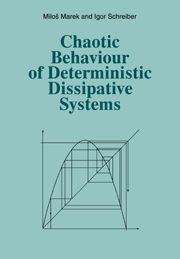Book contents
- Frontmatter
- Contents
- Preface
- 1 Introduction
- 2 Differential equations, maps and asymptotic behaviour
- 3 Transition from order to chaos
- 4 Numerical methods for studies of parametric dependences, bifurcations and chaos
- 5 Chaotic dynamics in experiments
- 6 Forced and coupled chemical oscillators – a case study of chaos
- 7 Chaos in distributed systems, perspectives
- Appendix A Normal forms and their bifurcation diagrams
- Appendix B CONT – a program for construction of solution and bifurcation dia-grams
- Index
2 - Differential equations, maps and asymptotic behaviour
Published online by Cambridge University Press: 24 November 2009
- Frontmatter
- Contents
- Preface
- 1 Introduction
- 2 Differential equations, maps and asymptotic behaviour
- 3 Transition from order to chaos
- 4 Numerical methods for studies of parametric dependences, bifurcations and chaos
- 5 Chaotic dynamics in experiments
- 6 Forced and coupled chemical oscillators – a case study of chaos
- 7 Chaos in distributed systems, perspectives
- Appendix A Normal forms and their bifurcation diagrams
- Appendix B CONT – a program for construction of solution and bifurcation dia-grams
- Index
Summary
Time evolution and dynamical systems
Physical, chemical, biological or social phenomena can be seen as systems characterized by a time evolution of their properties. Such evolution systems are ubiquitous in nature. Often we are able to express the rate of change of the properties of a considered evolution system in the form of equations, applying and combining the relevant laws of nature. Solutions of the constructed mathematical model then mimic the time evolution of the real system.
Our aim is to predict this evolution using a proper mathematical model. An instantaneous state of the model system can be given by a finite set of numbers or by a finite set of functions. A set of all states of the system will be called a state space (in physics literature it is also called a phase space). A system will be considered as deterministic if its future and past are fully determined by its current state. In a semideterministic system only the future is uniquely determined, while in a stochastic system neither the past nor the future is unique (this type of system will not be treated here).
A system of bodies moving according to laws of classical mechanics, electronic circuits or interacting populations in a closed ecological system may be considered as deterministic systems. An isothermal chemical reaction in an ideally stirred (homogeneous) environment is another example of a deterministic system, while the consideration of molecular diffusion makes the system semideterministic.
A substantial difference between the last two examples of evolution systems is in the dimension of the corresponding state space. Let X denote the state space and x its elements (states of the system).
Information
- Type
- Chapter
- Information
- Chaotic Behaviour of Deterministic Dissipative Systems , pp. 11 - 50Publisher: Cambridge University PressPrint publication year: 1991
